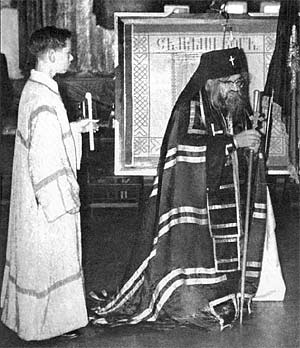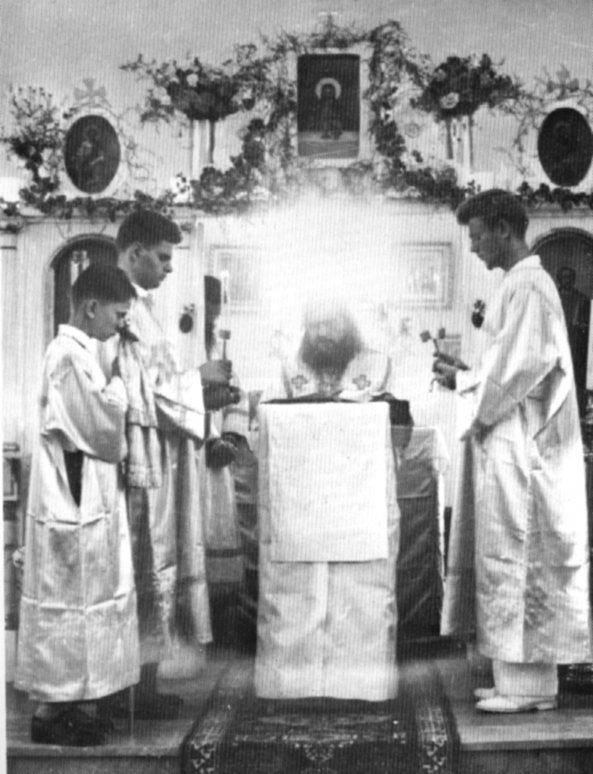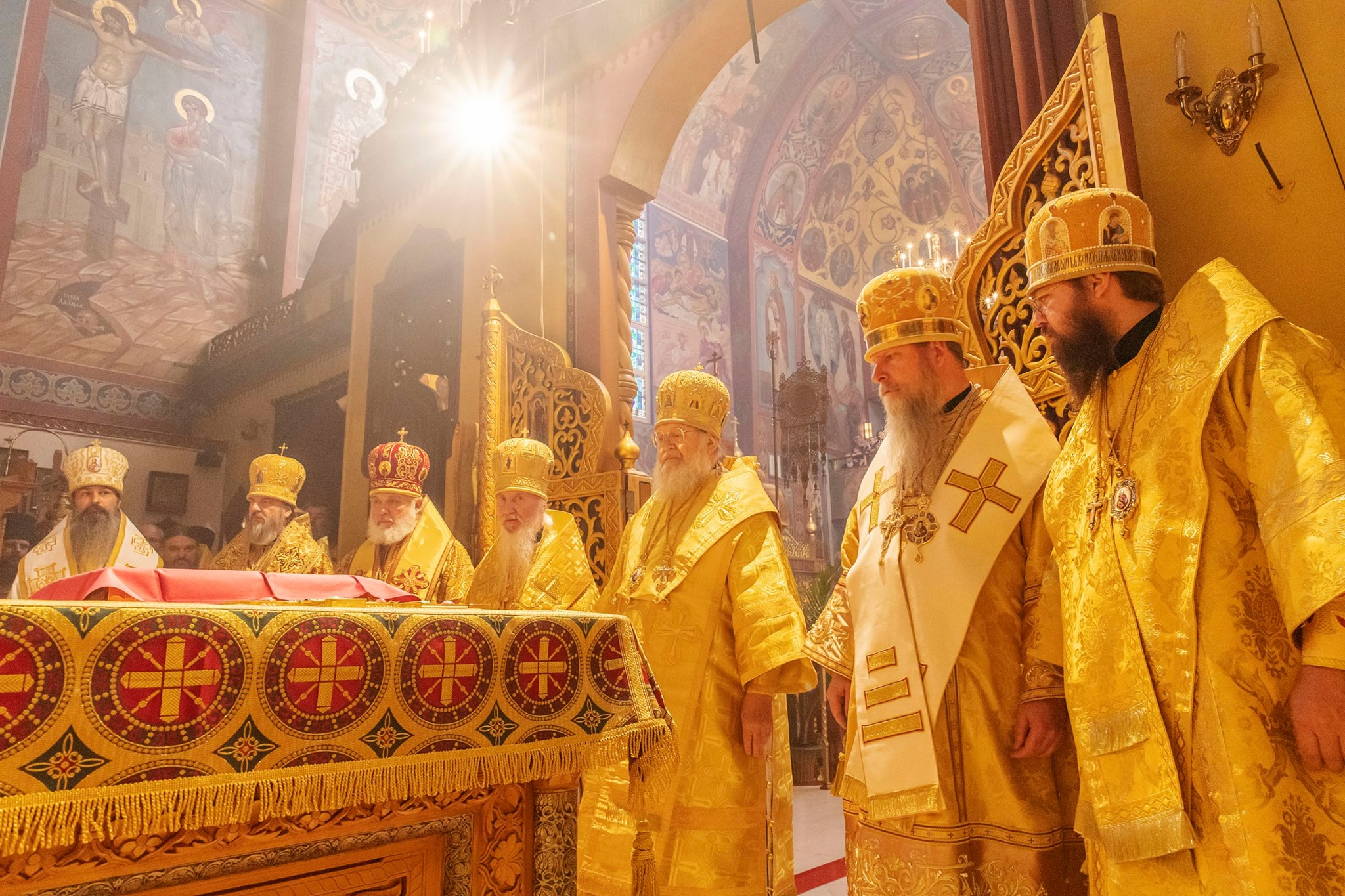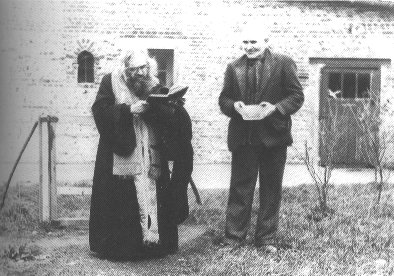

Romans 6:18-23
Psalm 9:1-10
Matthew 8:5-13
Where is the Kingdom? It is the place above places. The only reality finally. A span of time so great that our life on earth is barely a tick upon its clock. But where is it? Can we see it?
It is everywhere to be seen, everywhere men and women act and speak and think. It is always becoming. It is always around us. It is right there before us. The blessed Centurion saw it, that man we have quoted many thousands of times over our lifetimes and in triads:
|
Lord, I am not worthy that Thou shouldst come under my roof.
Lord, I am not worthy that Thou shouldst come under my roof. Lord, I am not worthy that Thou shouldst come under my roof. |
Today, we continue to be behold the Kingdom, and we continue to bear solemn witness to the outer darkness. We do and our parents did and their parents and theirs ...
Perhaps at no time in our lives, we who live at the Hermitage have been so aware of holiness and the Kingdom of Holiness, to which it belongs. In recent weeks, we have reflected on Orthodox Catholic bishops — not CEOs, executives, or political appointees, but rather holy men. By ancient tradition, they are the structure of the Church. Not their personalities, but their holiness. They were chosen to be the Apostles among us because holiness was seen in them. The Church is never more nor less than this: holiness, which alone can reside in humans, for this is God's only creature made to be holy and made to be permanent, living eternally ... whether in eternal darkness or eternal light.
|
Living stones built into a spiritual house, ... a holy priesthood,
to offer spiritual sacrifices acceptable to God. (1 Pt 2:5-6) |
When He breathed the Holy Spirit into the Apostles (Jn 20:22), founding the Church, He emplanted within these foundation stones the Divine Mysteries, with Reconciliation to God having pride of place:
|
If you forgive the sins of any, they are forgiven;
if you retain the sins of any, they are retained. (Jn 20:23) |
This is the life of the Church: following the bishop in his journey toward holiness — being renewed, nourished, married, buried, and entering the Kingdom of God through His sacraments, of which he and the other earthly Apostles are guardians:
|
Wherever the bishop shall appear, there let the multitude of the people
also be; even as wherever Jesus Christ is, there is the Catholic Church. (St. Ignatius of Antioch, Letter to the Smyrnaeans) |
 who said,
who said,
|
Sanctity is not just a virtue. It is an attainment of such spiritual
heights, that the abundance of God's grace which fills the saint overflows on all who associate with him. Great is the saint's state of bliss in which they dwell contemplating the Glory of God. Being filled with love for God and man, they are responsive to man's needs, interceding before God and helping those who turn to them. |
From his youth, Michael Maximovitch stood out for his spiritual promise. When in 1921 his family fled the Bolshevik Revolution and Russian Civil War, he was able to enter seminary in Belgrade, the capital of modern-day Serbia. Three years later he was tonsured a hieromonk. He was surrounded by holy bishops, one a noted poet and preacher and the other, the Metropolitan Anthony of Kharkov, the inaugural First Hierarch of the Russian Orthodox Church Abroad (which would become ROCOR). Throughout his life, Metropolitan Anthony would say, "If you wish to see a living saint, go to Bitol to Father John."
If one is rooted in the clay of this world, then one's own clay eventually will meld with the world until the two are indistinguishable. But if one rejects the world, then one might expect to see much more of Heaven on earth. This was the character and atmosphere of St. John's life. Indeed, the death-like posture of sleep had only a slender hold upon him. From seminary, no one saw him sleep, save brief "cat naps" while kneeling in prayer or standing. During his adult lifetime he never lay in a bed.
Thirteen years after beginning seminary and noted for his personal sanctity, he was consecrated a bishop, an occasion not of triumph for him but of humility. An acquaintance on a streetcar had asked the monk why he had come to the city, and he related that he was embarrassed because he seemed to picked up another man's letter by mistake, a different Hieromonk John, only to discover who was to be consecrated a bishop! Bumping into the young woman later that week, he confessed his humiliation at having been consecrated himself. I am not worthy, he told his consecrators. "I cannot speak clearly, and I stammer" — to which they replied, "This was true of Moses, who was summoned to the top of Mt. Sinai."
To all who saw him, St. John appeared to be small and weak, perhaps unable to cross a street without assistance. In the new Bishop's Letter of Introduction to the church in Shanghai, Metropolitan Anthony wrote,
|
Dear friend! I am very old and unable to travel ... But in place of myself,
as my soul, as my heart, I am sending you Bishop John. This little, frail man, looking almost like a child, is in actuality a miracle of ascetic firmness and strictness in our time of total spiritual enfeeblement. |
 His flock in Shanghai,
mainly refugees from Eastern Europe,
was in a shambles.
His first priority was their spiritual formation,
for the journey to Heaven is primary.
In fair weather and foul,
the little bishop would be seen at the bedsides of the sick and dying.
He went out nights searching back streets and alleys
for abandoned children,
creating an orphanage for them,
eventually gathering
1,500
homeless children
into warmth and safety.
When the atheist Communists rose up in China as they had in Russia,
he evacuated the children to an island in the Philippines and thence to America.
His flock in Shanghai,
mainly refugees from Eastern Europe,
was in a shambles.
His first priority was their spiritual formation,
for the journey to Heaven is primary.
In fair weather and foul,
the little bishop would be seen at the bedsides of the sick and dying.
He went out nights searching back streets and alleys
for abandoned children,
creating an orphanage for them,
eventually gathering
1,500
homeless children
into warmth and safety.
When the atheist Communists rose up in China as they had in Russia,
he evacuated the children to an island in the Philippines and thence to America.
On one occasion a parishioner had contracted rabies after being bitten by a stray dog. St. John administered Holy Communion, which she then spat back out involuntarily. To the horror of all, St. John pick it up and placed it in his own mouth that it not be dishonored. "Vladyka," they cried, "rabies is virulent and highly contagious through saliva!" But St. John refused to believe that the Holy Gifts could be anything but lifegiving and was proved to be right.
On another occasion a parishioner had so badly fractured her skull from a fall that the surgeons held out no hope. Even if she survived surgery, which they doubted, she could not hope to become anything more than a vegetable. Yet, Vladyka John prayed by her side and effected a miracle of restoration. She would have the surgery. She would survive. And she would return to the fullness of life.
His episcopal pastorate in Shanghai went forward in a general atmosphere of danger and chaos. The congregation itself was deeply divided along ethnic lines. The Japanese invaded, imposing a fierce regime of violence over the whole region. And China itself was torn by strife between Nationalists and Communists. Yet, he took all in stride and showed his people calm and kindliness. He drew the fragmented flock together completing a magnificent Cathedral in Shanghai. He ignored the stern curfew imposed by the harsh Japanese invaders and went about his pastoral visits as usual returning late at night.
When the Chinese Communists took over,
he shepherded the entire colony from Shanghai to the Philippines
appealing to international relief societies.
The island to which they were sent was notorious as a landfall for hurricanes in the season for monsoons.
One Russian expressed his anxiety to a Filipino man who told him not to worry,
for
"your holy man blesses your camp from four directions every night."
And,
indeed,
in an extraordinary season of calm,
not a single hurricane touched the island while the emigrees were present
with
only one threatening and then changing direction.

In a miraculous feat of bureaucratic navigation and negotiation, St. John was able to bring all of his people to America. Indeed, he caused new laws to be enacted in Washington to pave the way for the immigration of his people, and then founding the Cathedral of St. John the Forerunner in Washington while he was there. He would remain in America, where he continued his vocation as a true Wonderworker — a man who had become a veritable lifespring of miracles.
While in Shanghai, he had been elevated by the Russian Orthodox Church Outside Russia to Archbishop of China. And he ignored the Soviet authorities who by now had taken over the Russian Orthodox Church in Moscow. It is this relationship with the now-defunct Soviet Union that deserves our attention this morning, for he was forced to face the same soul-wrenching questions that we must face today:
Which will we choose? The choice actually is obvious and simple. But the doing of it may seem too much for us. Let us ask the little, frail man who simply followed God every day to pray for us. The life with God is always simple and obvious and straight while the road to darkness, the worldly life, is fraught with questions and complications and fears that are not God's but our own.
Pray for us,
St. John the Wonderworker,
for you are our Bishop, our Spiritual Father, and our Guide!
In the Name of the Father and of the Son and of the Holy Ghost. Amen.